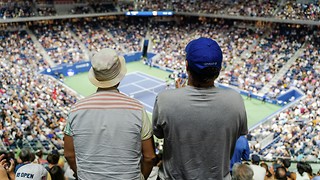Theatre: When the Rain Stops Falling
Salome Wagaine‘s lip wobbles at this epic, beautiful play

There are big issues (women lacking intellectual stimulation within their marriages, secrets kept within families, inclement weather, the end of the world). There are non-linear, interconnected narratives. And the show begins with a man in the future screaming at the heavens only for his calls to be answered with the dropping of a fish from the sky. When the Rain Stops Falling is some of the most affecting theatre I’ve watched in my time here.
There are some small flaws: the use of Styrofoam bowls for the characters to eat the soup from (admittedly, this does sound minor, but given that some of the eating provides a chance for the audience to get a strong comparative sense of the characters it matters) and I’m not sure whether or not the numerous televisions on stage were used to their full advantage, though they were a welcome if unusual presence at the ADC. However, what it got right, it really got right.
Andrew Bovell’s script is a difficult but beautiful one, characterised by sparseness and lyricism; director Emma Stirling did well to ensure its best was brought out, its complexities acknowledged but not overstated in the acting or staging. The opening monologue by Gabriel York (Ed Eustace) starts the play off relatively slowly, knowingly off-beat comedy offset by a reassuringly mundane character (he is the man with the fish). And then the stakes start, inexorably, to rise. This is a play which is nothing if not impressive in its scope and ability to tease out tension, assuredly nodding at the idea of tragedy but not so much that it becomes another piece of writing that must resort to ‘re-imagining’ the classics unsuccessfully and unimaginatively. There are moments of real humour and a capturing of the everyday, with Olivia Emden as the younger Gabrielle Law pulling off post-coital nonchalance with ease and Arthur Sturridge’s Henry Law as the picture of the postwar middle-class husband, almost unbelievably sincere in his intellectual zeal.
Nevertheless, it remains the portrayal of Elizabeth Law by both Hellie Cranney and Mary Galloway (the younger and the older, respectively) that holds the key to the most powerful aspects of the play. Although the true test of theatre is not how many tears a scene can elicit from its audience members, it is probably worth mentioning if the acting makes the reviewer teary-eyed. What is key, though, is how good both Cranney and Galloway are at developing their shared character, the former’s anger and the latter’s dignified but hopeless attempt at restraint fitting together.
When the Rain Stops Falling is sprawling and yet compact, a wonderful collection of tied-up personal stories whose intimacies allow for the ambitious writing and scope to pull off talking about the big questions without insincerity or gratuitousness.
When the Rain Stops Falling is playing until Saturday at the ADC, 7.45pm
 Features / The community Cambridge accommodation creates (and doesn’t)9 August 2025
Features / The community Cambridge accommodation creates (and doesn’t)9 August 2025 News / Trinity sells O2 Arena lease for £90m12 August 2025
News / Trinity sells O2 Arena lease for £90m12 August 2025 Lifestyle / An ode to college accommodation11 August 2025
Lifestyle / An ode to college accommodation11 August 2025 Sport / ‘A full-time job with overtime’: should disparities change the way we approach Bumps?6 August 2025
Sport / ‘A full-time job with overtime’: should disparities change the way we approach Bumps?6 August 2025 Features / Incoming freshers and their hopes, fears and expectations for Cambridge 12 August 2025
Features / Incoming freshers and their hopes, fears and expectations for Cambridge 12 August 2025










